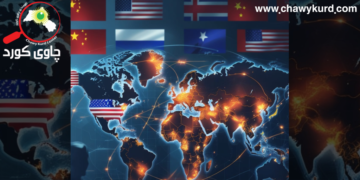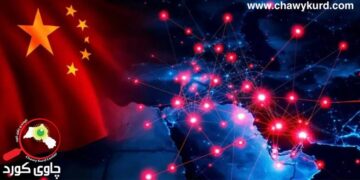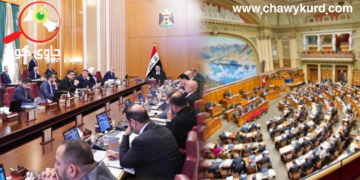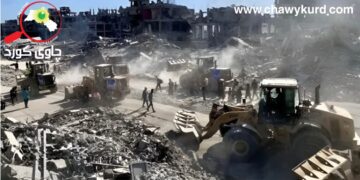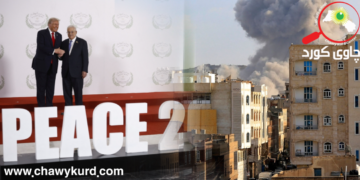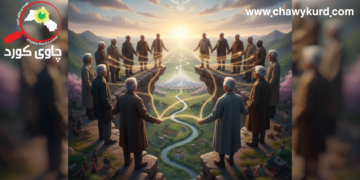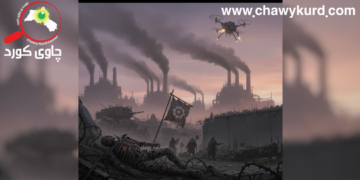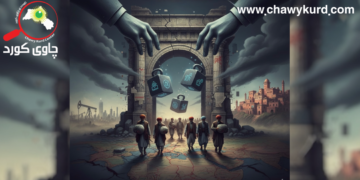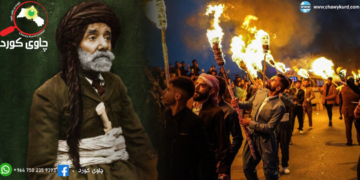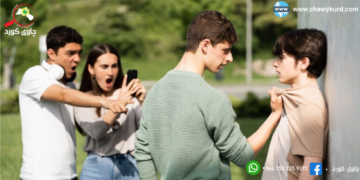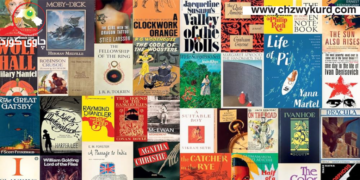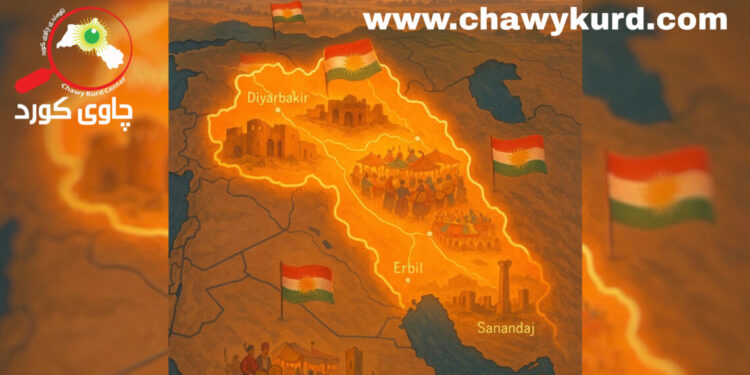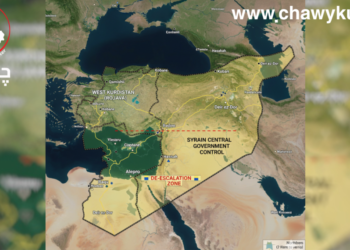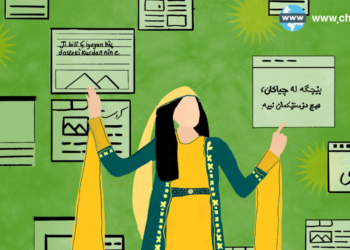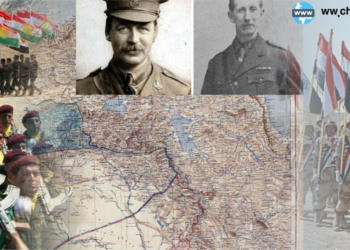The Kurdish nation, like all other nations globally, has traversed various stages of struggle and nationalistic thought. In each stage, this nationalistic thought was a product and reflection of its time. The geographical and political dispersion and division of Kurdistan among several states have prevented the formation of a unified national identity, thereby hindering the development of a common strategy. Currently, the Kurds do not possess an independent political entity (meaning a state); the only officially recognized entity is the Kurdistan Region within Iraq, as a federal region acknowledged in the 2005 Iraqi constitution. This entity is the fruit of immense sacrifices and has become a refuge and supporter for other parts of Kurdistan and Kurds worldwide. The Kurdistan Region has taken significant diplomatic steps, often being treated as a “state actor” by global nations, which has strengthened nationalistic sentiment. However, despite the hopes placed on the Kurdistan Region’s legal and constitutional entity and the positive steps taken, Kurdish nationalistic thought in the region faces several challenges (the main focus of this article) that have weakened this sentiment. Some of these challenges, in the modern and scientific world, are identified by many thinkers in international relations as societal challenges (referring to issues of identity, language, etc.), as threats to national security are no longer solely military but diverse: political, military, economic, environmental, and societal. These factors contributing to the weakening of nationalistic thought in the Kurdistan Region are outlined below:
First: The Issue of Identity
According to the Copenhagen School, particularly Ole Wæver, societal security refers to a society’s ability to maintain its way of life amid changing conditions and potential threats. This perspective views identity as the core of societal security. Due to the Kurdistan Region’s lack of an independent state and the direct and indirect pressure from surrounding countries, Kurds have had to sustain their national life alongside nations with different identities. Simply put, identity is what defines an individual and distinguishes them from others, or the unique characteristics that differentiate a person, group, or entity within a society. Identity can be classified into individual, collective (group), cultural, and national identity. National identity is the highest level, encompassing all others and reflecting an individual’s connection and affection for their national community. The components of Kurdish identity are based on land, language, shared memory, and common history. In this context, the flag, national anthem, Peshmerga, and even the political entity of the Kurdistan Regional Government can be considered national symbols or core components shared by all ethnic, religious, and sectarian groups in Kurdistan. Any sub-national or supra-national identity that threatens these national symbols and components is considered a security risk.
While globalization has fostered post-national ideas, national identities in the 21st century have become more complex and a primary source of conflict. Globalization, by disrupting traditional conditions and sources of classical identity formation, has created a widespread identity crisis. Simultaneously, it has created a fertile ground for new identities as part of pluralism or universalism, allowing everyone to enter this market. In reality, there are multiple threats to the national identity of citizens in the Kurdistan Region, particularly due to the political situation that has divided Kurds among regional countries, placing them under the influence of these nations in many aspects. Even internally, socially, there is a significant threat: tribalism and regionalism are core principles of social organization in Kurdistan. Currently, social relations are in great turmoil; relations between Kurdish components themselves, and between Kurds and other ethnic groups, are generally weak, leading to a kind of fragmentation within the cultural and social fabric of Kurdistan. Social classification of individuals into smaller groups leads to the emergence of diverse, conflicting identities, as individuals accept membership in a social group as a definition of self. In the Kurdistan Region, small groups constitute the entire identity framework, making it very difficult to find a comprehensive social identity built on social cooperation.
Despite all this, the role of religion in the Kurdish community’s identity in the Kurdistan Region cannot be overlooked. In 2015, the Kurdistan Parliament, in its fourth term, passed Law No. 5 of 2015, the Law on the Protection of Components in the Kurdistan Region. The law, presented in three sections and nine articles, recognized the components (Turkmen, Chaldean, Syriac, Assyrian, and Armenian) and religions (Christian, Yazidi, Mandaean Sabaean, Kakayi, Shabak, Faili, Zoroastrian, and others) in its first article, points one and two. There is a special directorate for religions within the Ministry of Endowments and Religious Affairs. Most Kurdish individuals consider themselves religious and believe in the necessity of religion in society. Thus, for some Kurds, religious identity defines their political identity more than other social identities. Furthermore, the presence of these components in the Kurdistan Region has always been a pretext for countries to interfere in Kurdistan’s internal affairs to support these components, particularly Turkey, which has intervened extensively in Iraq and the Kurdistan Region under the guise of protecting the rights of components, especially in Kirkuk, Erbil, Tal Afar, and areas with Turkmen populations. Regarding the flag, it is one of the important symbols of national identity. Besides the internal situation in Kurdistan, the Kurdistan flag has faced opposition from the Iraqi government and other countries. The most vivid example was the issue of raising the Kurdistan flag on March 18, 2017, when, at the request of the Kirkuk governor, the Kirkuk Provincial Council, by a majority vote, decided to raise the Kurdistan flag on government buildings in the province. This event sparked various reactions from Kirkuk’s components, the Iraqi government, and even regional countries, including the Turkish Ministry of Foreign Affairs, which expressed its concern against the decision. Additionally, internal conflicts and their repercussions on the region’s governance experience, poor governance performance, the absence of a healthy political system in Kurdistan, the lack of a genuinely unified administration, and sometimes the incitement of regional sentiments by political forces and the resurgence of tribalism pose serious threats to identity security and even the political entity of the Kurdistan Region.
Second: Mixing Nation and Political Authority
In most countries worldwide, some citizens are concerned about the policies implemented by authorities, which is natural and considered a healthy sign for the political system. However, what is unnatural is the mixing of opposition to authority with opposition to the nation by some opposition forces and citizens. Unfortunately, in the Kurdistan Region, this has been explicitly felt in recent years, with internal conspiracies and external support. Under the pretext of disagreement with the dominant forces, they are willing to destroy and oppose all national sacred values and noble principles, which is considered a dangerous alarm for nationalistic thought. Dissatisfaction with the government or existing shortcomings should not and cannot, under any pretext, be viewed as opposition to the nation or vice versa, because political authority and systems change and do not last forever; what remains is the nation and its sacred values.
Third: Social Media Platforms
The impact of social media platforms on nationalistic thought is twofold: while they can encourage the strengthening of nationalistic thought, they have also become a source of its reduction or weakening among the youth, especially since youth are the strongest force for changing societal trends. Some Kurdish youth use social networks in an unhealthy way, resulting in the production of inexperienced and negligent youth in society, young people who cannot dedicate their time to reading books and gaining knowledge about their history, nation, and homeland, but are willing to spend many hours on electronic games and other platforms. This has reached a dangerous level where some citizens express their anger and concern, even showing happiness on social media and TV channels about the disappearance of the Kurdistan Region’s entity and wishing for the era before its establishment.
Fourth: Language
Because language is a crucial and highly valued issue, playing a significant and prominent role in building a national identity, it is an essential tool for national identity and plays a critical role in nation-building. Nation-building refers to the process of constructing a national identity by leveraging state power. Whenever the Kurdish society faces threats to the Kurdish language and culture, the national security of the region, directly or indirectly, overtly or covertly, comes under threat. One such threat is the increasing hegemony of neighboring countries, especially Turkey and Iran, and particularly Arab culture, over Kurdish society. The Kurdish language is still primarily spoken in a regional area across Kurdistan’s geography. The diversity of its dialects and the lack of a standardized language have prevented it from becoming a single, universally understood means of expression and self-representation for all Kurds, even within Kurdistan itself. Therefore, the weakening of the Kurdish language and the lack of a standard language are primary factors in weakening the sense of unity and Kurdish identity. Consequently, we observe that in the current state of the Kurdish language, Hawrami, Sorani, and Badini identities are stronger than the Kurdish identity. Undoubtedly, this situation has several causes, chief among them the division of dominant Kurdish forces, the absence of bold political decisions, and the failure to rely on academics and specialists in the field to prevent regionalism and realize the long-held dream of a unified official written language, organizing political, economic, cultural, literary, scientific, and diplomatic spheres with it.
Fifth: The Issue of Displaced Persons and Refugees
One of the issues that poses a threat to the security and stability of a country is the topic of migration from one country to another, or the large number of displaced persons and refugees, which can lead to demographic changes in an area. This disrupts most aspects of security, especially societal security. Throughout its existence, the Kurdistan Region has faced several waves of displaced persons and refugees. However, primarily after the Syrian war, the ISIS war, and the events of October 16, 2017, particularly the ISIS war and the Syrian war, hundreds of thousands of displaced persons and refugees came to the Kurdistan Region. This occurred despite the Kurdistan Region’s incomplete economic and political situation, creating a significant burden on the region in all aspects, especially economically, with annual costs estimated at nearly 1.4 billion dollars. Regarding internally displaced persons, most of whom came from central and southern Iraqi cities, especially after the ISIS war: from the fall of Mosul in 2014 until its liberation in 2017, more than one million people were displaced from the city, representing most of its population. Approximately 60% were displaced to the Kurdistan Region. The number of internally displaced persons in 2014 was 1.1 million in the Kurdistan Region, more than half of whom were from Nineveh Governorate, and 20% were from Salah al-Din Governorate. Erbil and Sulaymaniyah hosted the most diverse types of displaced persons, but most of the displaced persons in Duhok Governorate were solely from Mosul. Out of the total population of the Kurdistan Region in 2016, 1.1 million were internally displaced persons (accounting for 16% of the Kurdistan Region’s population) and 200,000 refugees (3% of the Kurdistan Region’s population) were among its components. Of the 1.1 million internally displaced persons, 56% were in Duhok Governorate. This is in addition to the presence of approximately 242,000 Syrian refugees in the Kurdistan Region.
However, after the liberation of areas under ISIS control in Iraq and Syria, some of these displaced persons and refugees have not returned to their homes, especially in Iraq, due to political and sectarian conflicts and their displacement by other components. Although, according to the latest report from the Joint Crisis Coordination Centre of the Kurdistan Regional Government’s Ministry of Interior, the number of displaced persons and refugees in the Kurdistan Region has significantly decreased. Another issue that needs to be addressed is the migration of people from the Kurdistan Region, particularly youth, abroad. Migration is a global phenomenon, but its causes vary: political, economic, social, etc. However, generally, the common point for human migration is to reach a calmer, happier, and better geography and area for living than where the migrant was previously. It can be noted that before 2014, we occasionally heard about the return of some citizens of the Kurdistan Region from 2005, after the fall of the Iraqi government, until 2013. However, from 2014 until the end of 2022, the total number of citizens of the Kurdistan Region migrating to foreign countries, especially Western states, has increased significantly. There are several different reasons for citizens of the Kurdistan Region leaving Kurdistan, the most important of which are: political instability, lack of social justice, lack of job opportunities and poor services, poor economic conditions and corruption, and the allure and attractiveness of Europe. Thus, it becomes clear that for any country, this number of displaced persons and refugees is enormous, especially for the Kurdistan Region, where this number is exceedingly high. The presence of such a large number poses security threats to the Kurdistan Region’s security in most sectors and leads to several crises. This is in addition to the possibility of demographic changes in the Kurdistan Region due to such a large number of displaced persons and refugees, and identity clashes are an open possibility, which is another significant threat to the Kurdistan Region’s security. On the other hand, some citizens of the Kurdistan Region have also left due to their dissatisfaction and unhappiness with the existing situation.
Sixth: Lack of a Common Discourse
While the establishment of the government, parliament, and legitimate institutions in Kurdistan was an important and positive step for Kurdistan, it later faced several serious and dangerous challenges to the region’s security. This began with internal conflict, which led to significant crises in the region. The repercussions and traces of that conflict are still vividly present and felt, marking the beginning of a political division in Kurdistan. The consequences of this administrative and political division, which emerged at that time, have not yet ended and continue to impact the governance experience of the Kurdistan Region. Currently, the division among political forces, especially in recent years, has been exacerbated by a severe political and economic blockade imposed by Baghdad on the Kurdistan Region. This has now reached its most difficult stages, involving the withholding of salaries for civil servants in the Kurdistan Region and the impoverishment of its citizens. Despite all these pressures and pretexts from the central government against the region, unfortunately, a common national discourse towards Baghdad and many other issues has not been achieved. This is particularly due to some forces, for their political ambitions and to attract the sympathy of some voters, being unwilling to adopt such a national discourse against Baghdad. This further divides the people and has contributed to the weakening of nationalistic thought, to the extent that party sentiment and narrow party interests have been prioritized over national issues by some of these entities.







